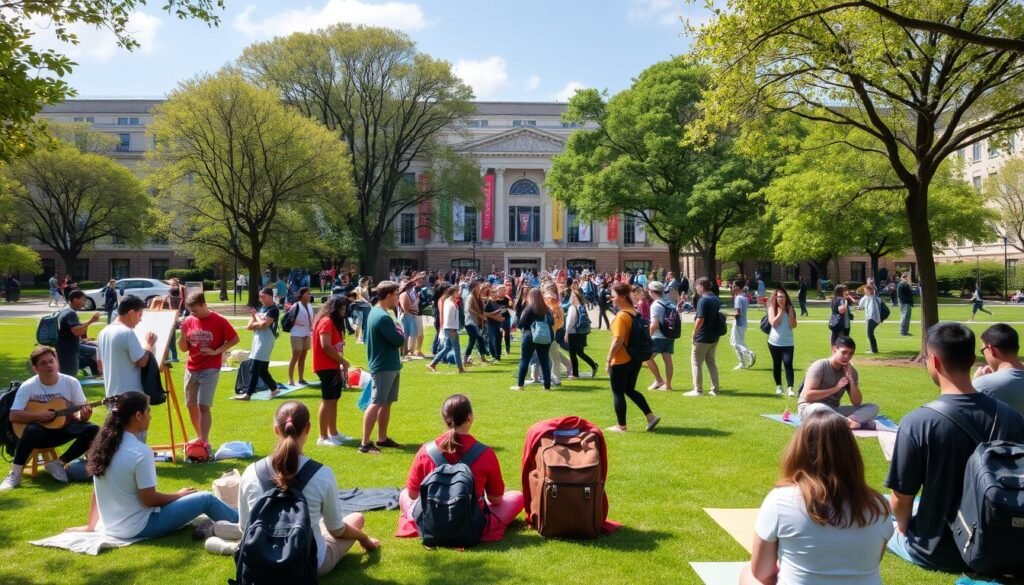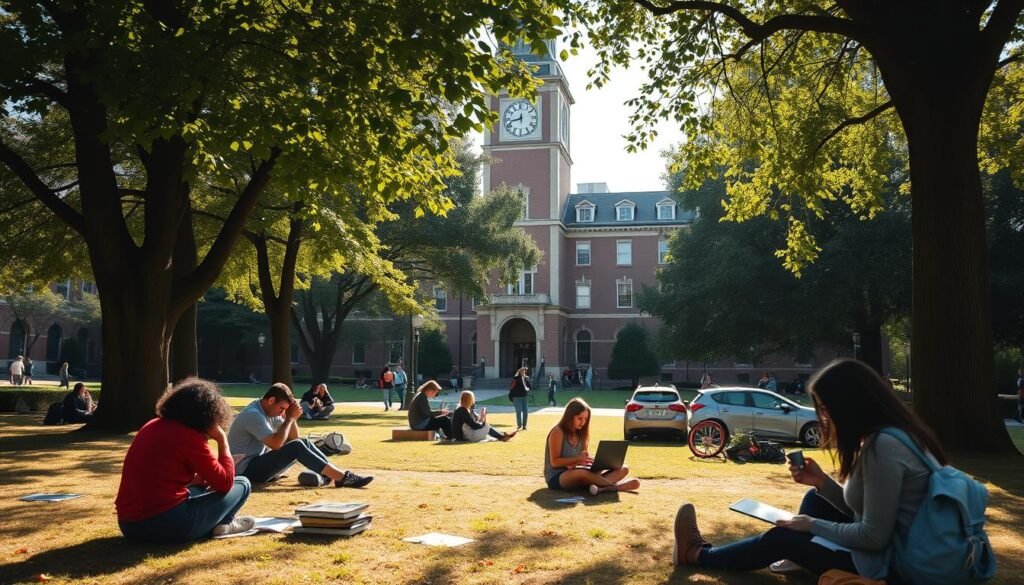Many students find it hard to balance university studies with a social life. But, with good time management, healthy habits, and setting boundaries, it’s doable. By focusing on what’s important, joining clubs, and being flexible, students can enjoy both school and social life.
Key Takeaways : University Studies and Social Life
- Develop a weekly schedule to manage time effectively and prioritize tasks
- Incorporate meal prepping and regular exercise to maintain a healthy lifestyle
- Set boundaries and avoid distractions to stay focused on your studies
- Engage in extracurricular activities to balance academic and social commitments
- Adapt to challenges and be flexible to find the right balance between studies and social life
Effective Time Management Strategies
For university students, managing time well is key. It helps balance school work and a fun social life. By planning and organizing, students can focus on studies and still enjoy activities outside class and keep up with friends.
Creating a Weekly Schedule
Start by using a calendar or planner for classes, work, and deadlines. This helps students see what they need to do each week. A daily routine and a consistent weekly plan help use time wisely and avoid feeling stressed.
Prioritizing Tasks and Assignments
Good time management means putting tasks and assignments in order by their importance and deadlines. Students can make to-do lists and use tools like the Pomodoro method to manage their time. Doing important tasks first and breaking big projects into smaller steps helps avoid last-minute stress and makes time for fun.
| Time Management Strategies | Description |
|---|---|
| Weekly Scheduling | Utilize a calendar or planner to map out classes, work, and deadlines |
| Task Prioritization | Create to-do lists and focus on high-priority assignments first |
| Productivity Tools | Implement techniques like the Pomodoro method to boost efficiency |
“Effective time management is the key to balancing university studies and a vibrant social life. By creating a structured schedule and prioritizing tasks, students can excel academically while still making time for the activities and connections that enrich their overall experience.”
Maintaining a Healthy Lifestyle
It’s tough to balance university studies and social life, but staying healthy is key to doing well. By focusing on self-care, students can do better in school and have a good social life too.
Meal Prepping for Convenience
Meal prepping is a great way to stay healthy. It means making healthy meals ahead of time. This saves time and ensures students have balanced meals ready to go. It helps them stay energized and focused on their studies without the hassle of finding food.
Regular Exercise and Self-Care
Along with eating well, regular exercise and self-care are important for students. Activities like sports or fitness classes can help manage stress and boost mental sharpness. Adding hobbies and fun activities to their schedule gives them a break from school work. This helps with mental health and social connections.
By focusing on a healthy lifestyle, students can keep a balanced life at university. This leads to better energy levels, physical fitness, and overall well-being.
“A healthy lifestyle is not about depriving yourself, but about living life to the fullest and feeling your best.” – Unknown
Setting Boundaries and Avoiding Distractions
Finding the right balance between school and social life is tough. But, setting clear boundaries is crucial for doing well. Saying “no” to social plans when school needs your focus is important. Staying away from distractions like social media or a messy study area helps you concentrate better.
Having a special place to study without distractions is key. Turn off your phone and keep your study area tidy to stay focused. Choosing which social events to attend and saying no when needed lets you have time for school and yourself.
Getting support from friends and family can also help. By setting boundaries and avoiding distractions, you can keep a healthy lifestyle. You’ll be able to focus on your studies and still enjoy social life.
| Strategies for Setting Boundaries | Avoiding Common Distractions |
|---|---|
|
|
“The ability to simplify means to eliminate the unnecessary so that the necessary may speak.” – Hans Hofmann
By setting clearboundariesand cutting down ondistractions, students can find a good balance between school and social life. This leads to betterfocus,productivity, andwell-being.
University Studies and Social Life
It’s key to balance university studies with a lively social life for a full college experience. Academic success is vital, but so are extracurricular activities and keeping up social connections. These aspects make a student’s time at university and college better.
Engaging in Extracurricular Activities
Being part of clubs, sports teams, or hobbies gives students a chance to meet new people and grow their network of friends. These activities boost social connections and let students try new things. They also help in learning leadership skills and getting into the social life on campus.
Doing extracurricular activities is a great way to take a break from schoolwork. It keeps students’ lives balanced and well-rounded.
Maintaining Social Connections
Spending time with friends and family gives students emotional support and motivation when school gets tough. Having a strong social circle makes university life easier to handle. It creates a feeling of belonging and community.
These social connections act as a support system. They offer encouragement and balance to students aiming for academic success.
“Finding the right balance between academics and social life is essential for a fulfilling university experience. It’s not just about studying hard, but also about engaging with the broader campus community and nurturing meaningful relationships.”
Adapting to Challenges and Staying Flexible
University life can be full of surprises, and students need to be ready for unexpected challenges. Being flexible and open-minded helps keep a good balance between school and social life. When school gets tough, it’s okay to rearrange social plans and talk openly with friends.
Practicing self-care techniques, like meditation or nature walks, can ease stress and procrastination. Using time management techniques, such as the Pomodoro Technique, can also help you stay productive and avoid last-minute stress.
Dealing with Stress and Procrastination
Changes and more school work can cause stress and procrastination. To fight these issues, students should make self-care activities a part of their daily life. Doing things like meditation, deep breathing, or being outdoors can help you manage stress and stay focused.
Also, good time management techniques can stop you from putting things off. The Pomodoro Technique helps you break tasks into smaller pieces and keep a steady level of productivity.
Also Read : Lesley University: Discover Your Path In Higher Education
“Adapting to change and staying flexible is the key to balancing university studies and social life. When unexpected challenges arise, self-care and effective time management can make all the difference.”
Conclusion
Finding a balance between university studies and social life is key for students. It’s all about managing time well, staying healthy, setting limits, and handling surprises. This way, students can do well in school and also enjoy their social life.
It’s important to find a balance that suits you and to be flexible. With the right mindset and support, students can excel in both academics and social life. This approach helps students grow into well-rounded individuals during their university years.
By using the tips shared in this article, students can handle university life better. They can keep up with studies and still have time for friends and self-care. It’s not easy, but with hard work, flexibility, and taking care of themselves, students can do well at university.
FAQs
Q: How can I manage my time effectively to balance academics and my social life?
A: To manage your time effectively, prioritize your tasks and set realistic goals. Create a schedule that allocates specific time for studying and engaging in social activities. This will help you stay on top of your workload while still enjoying a fulfilling social life.
Q: Is it okay to say ‘no’ to social activities when I have a heavy academic workload?
A: Yes, it’s perfectly okay to learn to say ‘no’ when necessary. Balancing academics and social life sometimes requires you to prioritize your studies, especially during busy periods. Remember that it’s essential to manage your time and avoid burnout.
Q: How can I ensure I get enough sleep while juggling academics and a social life?
A: To get enough sleep, set realistic goals for both your academic tasks and social activities. Stick to your schedule and avoid overcommitting to social events. This balance will help you maintain your health and well-being.
Q: What tips do you have for PhD students trying to balance their academic journey with social life?
A: PhD students should prioritize their workload by setting realistic goals and managing their time effectively. Engaging in social activities is important, but it’s crucial to allocate time for research and study. Don’t hesitate to seek a tutor if you feel overwhelmed.
Q: How can I engage in social activities without compromising my studies?
A: You can engage in social activities by planning them around your study schedule. Set realistic goals for your academic tasks and stick to your schedule. This way, you can enjoy your social life without negatively impacting your studies.
Q: How do I balance work, academics, and a social life?
A: Balancing work, academics, and social life requires careful planning. Set realistic goals for each area and manage your time wisely. Allocate specific time slots for work and study, while leaving room for social interactions.
Q: What are some strategies to avoid burnout while handling academics and a social life?
A: To avoid burnout, it’s crucial to set realistic goals and manage your time effectively. Ensure you get enough sleep and take breaks to recharge. It’s okay to say ‘no’ to some social invitations if it helps you stay on top of your academic responsibilities.
Q: If I need help with my studies, should I contact a tutor?
A: Absolutely! If you’re struggling to balance your academic journey and social life, don’t hesitate to contact us to find a tutor. A tutor can help you manage your workload more effectively and ensure you stay on track with your studies.
Source Links
- https://www.ucl.ac.uk/global-business-school-health/news/2023/apr/5-tips-balance-your-studies-alongside-your-social-life
- https://medium.com/university-of-nebraska-lincoln/balancing-school-jobs-and-a-social-life-cd2818a535f3
- https://www.vitastudent.com/en/blog/productivity/a-students-guide-to-balancing-academics-and-social-life/








